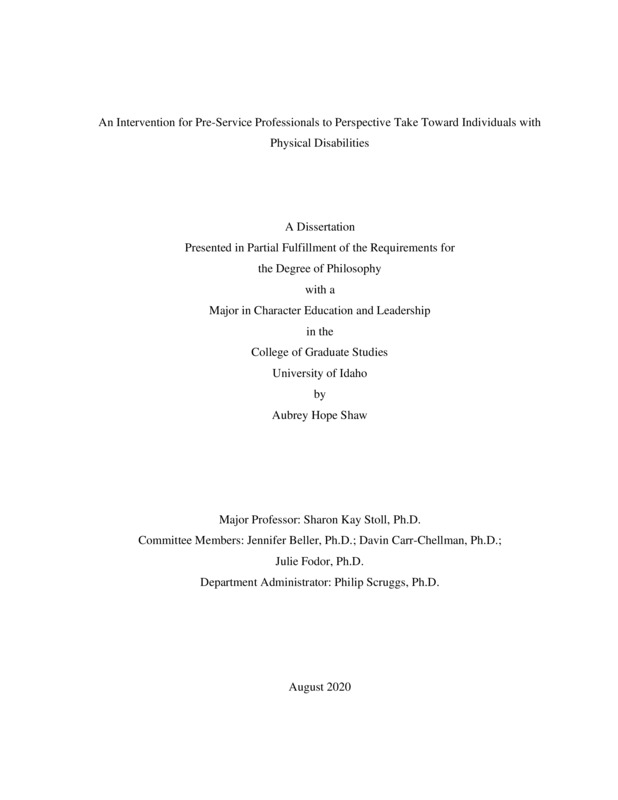An intervention for pre-service professionals to perspective take toward individuals with physical disabilities
Shaw, Aubrey Hope. (2020-08). An intervention for pre-service professionals to perspective take toward individuals with physical disabilities. Theses and Dissertations Collection, University of Idaho Library Digital Collections. https://www.lib.uidaho.edu/digital/etd/items/shaw_idaho_0089e_11916.html
- Title:
- An intervention for pre-service professionals to perspective take toward individuals with physical disabilities
- Author:
- Shaw, Aubrey Hope
- Date:
- 2020-08
- Keywords:
- Educational intervention Perspective taking Physical disabilities
- Program:
- Movement & Leisure Sciences
- Subject Category:
- Ethics; Disability studies
- Abstract:
-
Quantitative and qualitative research support that students with physical disabilities are excluded from physical education classes (Martin, 2018; Bredahl, 2013; Rizzo, 1984; Rizzo & Vispoel, 1991; Rizzo & Kirkendall, 1995; Hodge, Murata, & Kozub, 2002; Hodge & Elliott, 2013). Students with physical disabilities frequently want to play and be included, however, they are often given a different non-inclusive task such as walking around the gym or riding an exercise bike (Bredahl A.-M. , 2013). Teachers perceive the student with a physical disability as high risk, (Shaw & Stoll, 2018d; Shaw & Stoll, 2017; Shaw & Stoll, 2018b) and thus, students with physical disabilities are excluded (Smith, 2009). Potential factors arise as to why this discriminating practice exists including 1) implicit bias of the teachers, 2) negative teacher judgment about inclusion, and 3) teachers perceiving students with a physical disability as an object rather than a subject. However, U.S. Federal Laws explicitly prohibit discrimination against students with physical disabilities. Therefore, the purpose of this quasi-experimental study was to examine the effect of a perspective-taking intervention on 1) reasoning, 2) bias, and 3) judgment of pre-service physical education teachers toward people with physical disabilities.
Forty-four (44) participants completed all six intervention lessons. The intervention was compiled of six perspective taking lessons on different topics which plague people with physical disabilities. The purpose of the lessons was to create cognitive dissonance within the participants and inspire them to a different way of thinking to include people with physical disabilities. Additionally, the lessons had activities, questions, and reflections in which the participants could engage. What the participants had to say within their reflections from lesson one to lesson six shifted as the reflections became more thoughtful, longer in length, and more understanding of what people with physical disabilities experience daily.
Three instruments were used: (1) Hahm-Beller Values Choice Inventory (Stoll & Beller, 1998) which measured moral reasoning, (2) Hodge's, Murata's, and Kozub’s Judgments about inclusion instrument(2002) which measured judgments about inclusion, and (3) Harvard Implicit Bias Test (Harvard University, 2018) which measured implicit biases. One hundred and one participants enrolled in the intervention group and 32 originally enrolled in the control group. However, an additional 20 participants were added to the control group after one whole control group dropped out. There were thirty-one (31) participants in the intervention group who completed the Hahm-Beller Values Choice Inventory and all six lessons to the intervention and twenty-seven (27) participants in the control group who completed the Hahm-Beller Values Choice Inventory. There were twenty-five (25) participants in the intervention group who completed the Judgment about Inclusion Instrument and all six lessons to the intervention and eighteen (18) participants in the control group who completed the Judgment about Inclusion Instrument. Furthermore, there were nineteen (19) participants in the intervention group who completed the Harvard Implicit Bias Test and all six lessons to the intervention and twenty (20) participants in the control group who completed the Harvard Implicit Bias Test. Additionally forty-four (44) participants completed all six lessons. Lessons and answers given on questions were correlated; those engaged stayed engaged for the entire six lessons, and those who were engaged were engaged throughout all six lessons, that is 9 to 12 questions per lesson, 63 total questions.
However, the data on the instruments measuring moral reasoning, judgement bias, and implicit bias was not significant. The findings showed no significant difference between the intervention group and the control group for either the Hahm-Beller Values Choice Inventory and the Judgement about Inclusion Instrument. Additionally, the data was not analyzed on the Harvard Implicit Bias Test due to validity and reliability questions towards the instrument. However, the results suggest the intervention and the instruments used to measure the intervention were not measuring the same concept as the correlations on the questions within the intervention were significant with each other. Additionally, reflections from the intervention were analyzed and cognitive dissonance occurred.
From the findings, it is strongly suggested pre-service professionals should have a perspective taking intervention toward people with physical disabilities, as it will help the individual understand what it is like to be a person with a physical disability. Additionally, understanding how to treat a person with a physical disability as a sacred being and not an it (Buber, 1970) is pushing them into cognitive dissonance which is the goal of education.
- Description:
- doctoral, Ph.D., Movement & Leisure Sciences -- University of Idaho - College of Graduate Studies, 2020-08
- Major Professor:
- Stoll, Sharon K
- Committee:
- Beller, Jennifer; Carr-Chellman, Davin; Fodor, Julie
- Defense Date:
- 2020-08
- Identifier:
- Shaw_idaho_0089E_11916
- Type:
- Text
- Format Original:
- Format:
- application/pdf
- Rights:
- In Copyright - Educational Use Permitted. For more information, please contact University of Idaho Library Special Collections and Archives Department at libspec@uidaho.edu.
- Standardized Rights:
- http://rightsstatements.org/vocab/InC-EDU/1.0/

